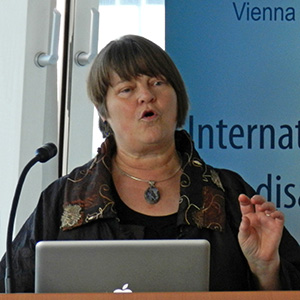

On 18 March 2014, the Vienna Center for Disarmament and Non-Proliferation (VCDNP) and the International Campaign to Abolish Nuclear Weapons (ICAN) co-hosted a public event entitled "Development of Humanitarian Disarmament Initiatives on Nuclear Weapons," featuring Dr. Rebecca Johnson, executive director of the Acronym Institute for Disarmament Diplomacy and co-chair of the International Steering Group of ICAN. Elena Sokova, executive director of the VCDNP, moderated the event.
Dr. Johnson highlighted the importance of considering the humanitarian dimension of the impact of nuclear weapons. She argued that the discussion of nuclear weapons has been dominated by talk of the military and strategic aspects, which has kept the debate away from the general public. The humanitarian discourse, on the other hand, looks at the real and foreseeable impacts and consequences of these weapons, putting human security at the center of the debate. The humanitarian approach is accessible to—and therefore includes the participation of—previously underrepresented groups, including those from the general public and representatives of countries without nuclear weapons.
Dr. Johnson offered a historical overview of legal instruments which incorporate humanitarian aspects into various forms of disarmament, emphasizing that humanitarian arguments did not just arise in recent years, but have long been a part of international agreements. For instance, the 1868 St. Petersburg Declaration considered humanitarian aspects of war and prohibited weapons that would "cause unnecessary suffering." The 1972 Biological and Toxin Weapons Convention, the 1993 Chemical Weapons Convention, and the 1997 Mine Ban Convention are also predicted upon the humanitarian consequences of these weapons.
Humanitarian aspects have further been considered in agreements concerning nuclear non-proliferation and disarmament. Starting with the resolution in the UN General Assembly in 1961, Dr. Johnson discussed other relevant nuclear disarmament treaties such as the 1963 Partial Test Ban Treaty, the 1968 Treaty on the Non-Proliferation of Nuclear Weapons (NPT), and the 1996 Comprehensive Nuclear-Test-Ban Treaty, all of which acknowledge the humanitarian consequences of nuclear weapons use and testing as the rationale behind their norms.

The humanitarian consequences discourse reframes the issue of nuclear disarmament as a humanitarian imperative and a responsibility of every government, including states without nuclear weapons. In recent years, states have begun to issue joint statements on the humanitarian consequences and implications of nuclear weapons. For example, at the 2010 NPT Review Conference, governments expressed their deep concern about the catastrophic humanitarian consequences of any use of nuclear weapons in the final document adopted by consensus; and most recently, 125 states signed on to a joint statement on humanitarian consequences of nuclear weapons at the 2013 UN General Assembly First Committee meeting. This debate also spurred the creation of intergovernmental conferences on the humanitarian impacts of nuclear weapons, the first of which was held in Oslo, Norway, in March 2013, and the second held in Nayarit, Mexico, in February 2014.
Dr. Johnson stated her view that the Nayarit Conference represents "a point of no return" for the integration of humanitarian consequences into the overall discourse on nuclear weapons. She relayed that the Nayarit Conference, which was attended by 146 states, international organizations, and civil society, covered the risks of limited, accidental, mistaken, unauthorized, or intentional use of nuclear weapons, to include the global and long-term consequences for socio-economic development and the environment. Studies on such risks, including a study on the consequences of a limited nuclear detonation in a major urban center, were among the presented issues.
Dr. Johnson underlined the need to learn more about the effects and risks of nuclear weapons as well as a need to identify possible solutions to such problems; she thereby supports the Austrian government's initiative to host the third Conference on the Humanitarian Impact of Nuclear Weapons later this year.
Dr. Johnson pointed out that nuclear-armed states, with the exception of India and Pakistan, did not participate in either of the conferences on the humanitarian impact of nuclear weapons. She called on these states to become involved in the humanitarian initiative, and argued that the discourse on humanitarian consequences of nuclear weapons will strengthen the NPT by examining the effects of nuclear weapons and providing further information regarding the need for nuclear disarmament.
By continuing to use the site, you agree to the use of cookies. more information
The cookie settings on this website are set to "allow cookies" to give you the best browsing experience possible. If you continue to use this website without changing your cookie settings or you click "Accept" below then you are consenting to this.